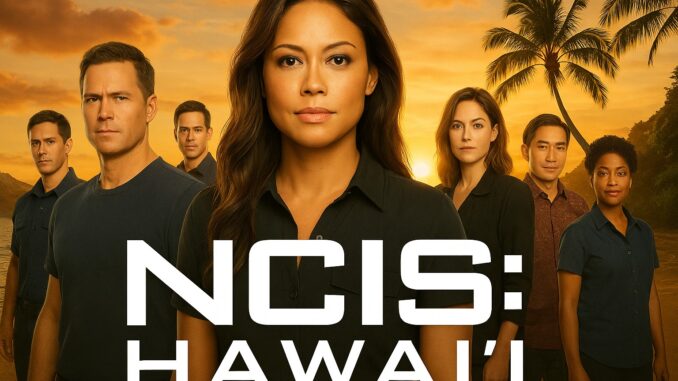
A Spinoff That Stood Out
When NCIS: Hawai’i premiered, it didn’t just feel like another procedural. It was a breath of fresh ocean air, a colorful new take on a familiar formula. Yet, despite its strong fan base, scenic backdrops, and dynamic cast, the show’s cancellation shocked viewers worldwide. Let’s dive into why this particular spinoff hit differently — and why its absence still feels like a hole in the NCIS universe.
The Birth of a Tropical Procedural
CBS’s NCIS franchise had already built a massive following with its Washington D.C. and Los Angeles teams. But in 2021, NCIS: Hawai’i arrived, bringing new energy, a diverse cast, and breathtaking scenery. Viewers weren’t just watching another case; they were visiting paradise each week.
Why Hawai’i Was the Perfect Setting
Think lush mountains, turquoise waters, and bustling Honolulu streets. Hawai’i’s setting gave the series a visual identity that no other NCIS installment could match. It wasn’t just about solving crimes — it was about solving crimes against the backdrop of a postcard.
Representation and Diversity on Screen
NCIS: Hawai’i also stood out for its inclusivity. The show featured a female lead Special Agent in Charge, Jane Tennant (played by Vanessa Lachey), a first for the franchise. Supporting characters brought authentic Pacific Islander, Asian American, and LGBTQ+ representation. This wasn’t tokenism; it was genuine progress.
The Cast That Made It Shine
From Vanessa Lachey’s steady leadership to Alex Tarrant’s nuanced portrayal of Kai Holman, the cast carried more than just scripts — they carried heart. The chemistry felt real, like an actual team rather than actors hitting marks.
Fan Favorites and Breakout Performances
Viewers quickly latched onto characters such as Lucy Tara (Yasmine Al-Bustami) and Ernie Malik (Jason Antoon), whose quirks and warmth added levity to the crime-of-the-week structure. Their banter became social-media gold.
On-Screen Relationships That Resonated
Unlike some procedurals, NCIS: Hawai’i allowed space for emotional arcs. Lucy and Kate’s relationship, for example, offered one of the franchise’s most genuine romantic storylines, which made their scenes a highlight for many.
Ratings vs. Reality: Why It Was Cancelled
So why did CBS pull the plug? Officially, it was about “network strategy” and “resource allocation.” Unofficially, it likely came down to cost versus ratings. Shooting in Hawai’i is expensive, and the network may have decided the return on investment wasn’t high enough.
The Cost of Filming in Paradise
Filming in Hawai’i means union labor rates, shipping costs for equipment, and pricey accommodations. Those beautiful aerial shots come at a premium.
The Changing TV Landscape
Streaming wars, shifting ad revenues, and shrinking linear audiences have made even well-performing shows vulnerable. Procedurals once considered untouchable now face the chopping block.
Fan Reactions: A Digital Outcry
Fans didn’t take the cancellation lightly. Hashtags like #SaveNCISHawaii and #BringBackNCISHawaii trended across Twitter and Instagram. Petitions surfaced, collecting tens of thousands of signatures.
Social Media as a Megaphone
Clips of favorite scenes racked up millions of views on TikTok. Fan art and edits flooded Pinterest and Tumblr. For a show that ran only three seasons, its online footprint is massive.
Why This Cancellation Feels Personal
Viewers didn’t just lose a show; they lost weekly visits with characters who felt like friends. In a world where people crave escapism, losing NCIS: Hawai’i hit especially hard.

The Lasting Impact on the NCIS Universe
Even in cancellation, NCIS: Hawai’i has left fingerprints on the franchise. Its crossover episodes with NCIS and NCIS: Los Angeles opened doors for new storylines and character connections.
Potential Spinoffs or Revivals
Could we see Jane Tennant or Lucy Tara pop up in another NCIS show? Absolutely. CBS has kept those doors open before — just look at how characters move between NCIS and NCIS: LA.
Lessons CBS Should Learn
The network should recognize the power of location diversity, inclusive casting, and fresh energy. If they ever launch another spinoff, NCIS: Hawai’i should be their blueprint.
What Made NCIS: Hawai’i Unique Among Spinoffs
It wasn’t just a copy-paste of the D.C. model. NCIS: Hawai’i mixed procedural storytelling with a sense of adventure. It felt like “Hawaii Five-0 meets NCIS,” but with a softer, character-driven edge.
Comparing to Other NCIS Shows
Where NCIS: LA leaned on action and tech, and the original on classic crime-solving, Hawai’i balanced mystery with heartfelt team dynamics.
Cultural Integration Done Right
Episodes regularly incorporated Hawaiian traditions, local politics, and real-world issues affecting the islands. That authenticity deepened the stories beyond generic crime plots.
Why Fans Still Hope for a Comeback
Revivals aren’t unheard of. Networks have resurrected shows after fan campaigns before. The show’s cast has hinted they’d return if asked, and streaming services sometimes pick up canceled series.
Could Streaming Save NCIS: Hawai’i?
Paramount+ already hosts NCIS content. If any platform could rescue the show, it’s this one. Stranger things have happened in TV land.
Keeping the Spirit Alive
Fans continue to hold watch parties, create fanfiction, and share memories. In many ways, NCIS: Hawai’i lives on because its community refuses to let it fade.
Conclusion: A Short-Lived Gem That Deserved Better
NCIS: Hawai’i wasn’t just another NCIS spinoff. It was a warm, visually stunning, inclusive series that broke new ground for the franchise. Its cancellation feels like more than just the loss of a TV show; it feels like losing a friend who brought sunshine into living rooms each week. Whether or not it ever returns, its legacy will continue to shape how fans view the NCIS universe.